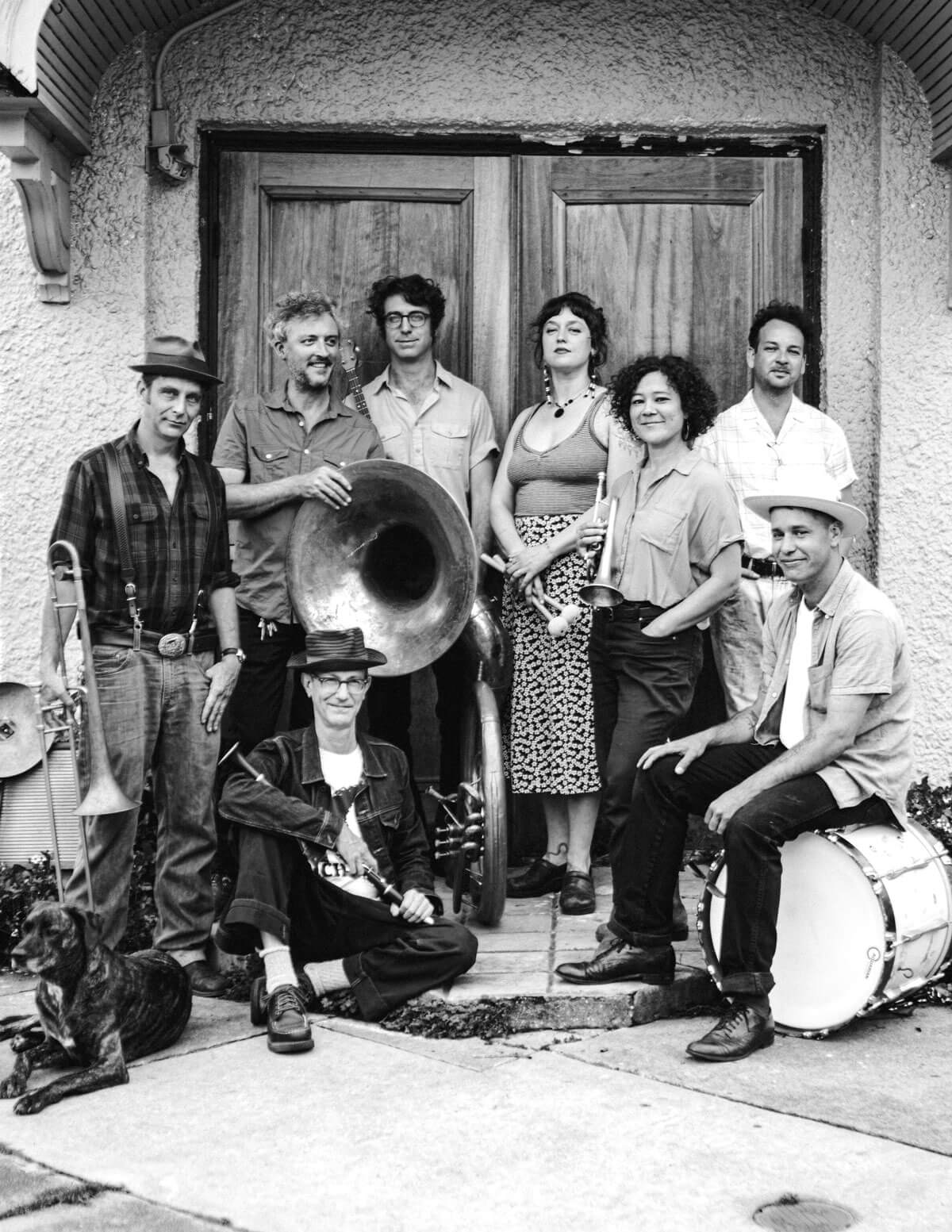Tuba Skinny
Friday 6/21 – 4:15pm on Blue Ridge Timberwrights Stage
For over a decade Tuba Skinny has grown steadily in popularity, releasing twelve albums and touring all over the world. They’ve attracted a wide variety of fans, young and old, neophytes and niche-enthusiasts, with the strength of their musicianship and the scope of their jazz and American roots music catalog.
Tuba Skinny started out as a busking band playing early jazz in the streets of New Orleans’ French Quarter neighborhood. While they’ve become known as world-class interpreters of traditional jazz, they have not limited their choice of material solely to what is offered in the traditional jazz repertoire. In fact, their goal is not to be boxed in by prescribed genre perspective.
They’ve also become known for seeking out and resurrecting long-lost tunes, digging deep into the recordings of both celebrated and obscure artists. Some favorite sources are Louis Armstrong’s Hot 5 and Hot 7, Jelly Roll Morton’s Red Hot Peppers, Bunk Johnson, George Lewis, Clarence Williams, The Mississippi Sheiks, Sam Morgan’s Jazz Band, Johnny and Baby Dodds, Blind Blake, Blind Boy Fuller, The Memphis Jug Band, King Oliver, and Bessie Smith, among many others.
Hand in hand with their musical prowess is the band culture Tuba Skinny has created. Some bands play in a style, some define a style, but few create a lifestyle. Part of what lends to their appeal is the allure of the way they live. Their touring adventures have found them swimming in the cenotes of Mexico, recording in an old fruit-picker’s shack in Tasmania, and biking across Europe, all the while sharing their music in the streets and concert halls of the world. It’s the way most of us can only dream of living.
Through it all, they’ve retained much of the same personnel. Cornetist Shaye Cohn maintains a loose leadership, working closely with Todd Burdick (tuba), Barnabus Jones (trombone), Robin Rapuzzi (washboard/percussion), Craig Flory (clarinet), Greg Sherman (guitar and vocals), Max Bien-Kahn (guitar and tenor banjo), and Erika Lewis (vocals/bass drum). Many others have filtered in and out of the band, some staying years, some staying seasons, each lending a new texture or tone. They make their choices democratically, often organically in the moment, resulting in a peaceful accord that is palpable when they play.
Almost as intriguing as the band’s playing and globetrotting is the way their popularity has spread. Since their formation Tuba Skinny has had a general lack of interest in social media. For most of their existence they’ve had no YouTube account, no Instagram, a bare-bones Facebook account, and a functional website. However, if you do a YouTube search of “Tuba Skinny” you will find more than 500 videos. Many of these videos have over 100,000 views and are listed in a variety of languages from accounts all over the world. Their fans have, in a way, crowd-sourced a digital presence for the band via YouTube, social media, and blog posts. In an era of self-made internet fame, not only is this truly radical, but it also stands as a testament to the band’s genuine appeal.
Another astonishing thing about Tuba Skinny is that their music has not been available with digital service providers like Spotify or iTunes. It’s only been available online for purchase on Bandcamp. What’s more, they only sell their physical CDs at gigs or through Louisiana Music Factory- partly out of loyalty to small business and partly out of not wanting the hassle of dealing with larger companies. Once again, what would be considered antithetical to standard digital era practice has proved positive that when art has true value, people will stop at nothing to find it.
No matter how well known they’ve become or how high profile their gigs have gotten, Tuba Skinny has always returned to the streets. “We continue to play the street because it’s a public space,” says Shaye. “We get to play for everyone: old, young, rich, poor, people from all walks of life. It keeps things interesting because it’s organic and unpredictable.” This commitment to their roots, perhaps above all else, is what has led to their sustaining strength and widespread popularity.
The COVID-19 pandemic was a time of great change for many people and for Tuba Skinny there was no exception. With venues closed and public gatherings prohibited, like many artists, the band turned their focus inward.
After a decade of playing (mostly) other artists’ songs, Tuba Skinny decided to fulfill a long-time dream with the release of Magnolia Stroll, their first album of all-original tunes. Featuring compositions from Erika, Shaye, Robin, Barnabus, Craig, and Max, it is their love song to all the musicians, living and dead, who have inspired them, as well as to the neighborhoods of New Orleans that have nurtured them.
The band recorded the album at The Tigermen Den in New Orleans’ historic Bywater Neighborhood. Pandemic restrictions made for a unique recording experience. “We wanted to keep the doors open while we recorded in order to allow for ventilation, since Covid was still unfolding and we were trying to maintain safe protocol,” says Shaye; “so we opened the French shutters of the building, which overlooked a neighborhood cafe. People walking by tipped us as we recorded.”
The album has fifteen tracks, which are laced together with the band’s favorite kind of gentle rhythms. Each has a story of a place and time, pulling from their years of touring experiences and favorite musical influences. Robin’s Benny Moten influenced “Ida Wobble” came out of the long, powerless days after Hurricane Ida. Shaye’s “Deep Bayou Moan” is a mournful piece, written on her keyboard late at night and coming from a place of grief and heartbreak, as well as the determination to persevere.
This is the band’s most personal album yet and marks a new chapter in their evolution. What’s more, because of COVID protocol, they’ve recorded what might be the truest reproduction of their busking sound.

